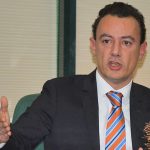Alexandre the Great, The man salvaging Portugal’s telecoms reputation
Since taking the helm at Altice Portugal, the country’s largest telecommunications company, CEO Alexandre Fonseca has created a strategic vision which included the acquisition of a media group. However, the deal was turned down by the Portuguese competition authority. Altice Portugal’s CEO explains to Essential Business why that decision was short-sighted
Google “Altice CEO Alexandre Fonseca” and he appears in good company in the search engine with Alexander the Great.
That might be viewed as a source of amusement, pride or vanity, but when he was invited to take the helm at Altice – what had been one of Portugal’s most troubled companies, Portugal Telecom – with a serious public image problem, he needed all the courage and strategy of the famous Greek warrior to put the company to rights and, in less than two short years, he has largely won the battle.
In the fourth quarter of 2018, Altice revenues grew to €526 million – the fifth quarter of consecutive growth with 4.49 million homes covered by fibre optics (+120,000 in Q4 2018) with a target of 5.3 million homes by 2020. Mobile network enjoyed 93.3% cover in 4G and 74.6% in 4G+ in population terms in 2018. Capex investment ended the year at €120 million for Q4 (versus €133 million in Q4 2017). Fixed service clients grew 8,400 while new net fibre clients stood at 44,500. Altice Portugal captured 40% of the broad band market and 55% of the growth share in Portugal’s TV market.
“When I arrived in June 2015, I was appointed Altice Chief Technology Officer. My first impression was, this was a company with huge potential, not just because of its market share but the human capital, the scope of the products and services we were delivering. But I also saw huge potential to optimise all the resources we had available and make Altice Portugal more efficient.”
Fonseca says that all the assets, products and services were in place, but in a rather raw state given the years leading up to his arrival.
New targets were set by the shareholders, which he delivered. One of these was to optimise one area which represents 50% of the labour force – Engineering and Operations. It is one of the core areas of the company in terms of technology. Optimising means using them in the right way and cutting costs, optimising spending, improving capital expenditure rates (CAPEX), which had been low, and bringing more innovation on board.
Fonseca says: “I think things went according to expectations. We achieved great performance in the shareholders’ view in the technology performance area. What I believe was missing, however, was a focus that this company is much more than just a telecoms operator in Portugal. This company is a driving force for the economy and society in Portugal.”(stand alone quote)
Altice is one of the top three companies in Portugal in revenues and one of the biggest employers with a workforce of 20,000. It is also one of the biggest spenders and investors in the country (€2 billion over four tax years) Investments in terms of infrastructure deployment (optical fibre and 4G/4G+ networks) took up one-third of that – €400 million.
Giving back to society
“What was missing was being a driving force in the Portuguese economy, not in terms of employment as we are one of the biggest employees, but social, cultural, educational and health campaigns. In all these areas, we have been giving back to Portuguese society through the Altice Foundation (around €2 million), one of the most active and recognised foundations in Portugal,” explains Alexandre Fonseca.
This was something positive that Portuguese families and the ordinary man in the street could recognise that Altice was doing, instead of all the negative buzz surrounding a French company (it actually has a Portuguese owner as well) penetrating the Portuguese market and buying one of the jewels in the crown.
“I would say people have made a lot of unfair comments about our strategy, plans and views without seeing the whole picture, but our problem was that we had not been effectively communicating the positive side of the story,” says Fonseca.
“Altice is a very particular company, especially for consultants like me who have worked for IBM and PricewaterhouseCoopers. It is still a family-run business despite being the seventeenth largest telecoms operator in the world.”
Fonseca explains that in the summer of 2017, when company shares dropped, the shareholders understood from a global perspective that they needed to change the management style.
“In Portugal, the shareholders wanted one in line with a big corporate firm, but Altice wanted to keep the values that run through the Altice story: trust, confidence and relationships, and these were the ones that needed to recover. We had to get back to basics, return to our values and that’s when they called me and offered me the challenge,” he explains.
The strategy was to tackle the bad perception Altice (or rather PT) had in the marketplace. “It was not the case that we were doing a really bad job. Far from it. The problem was that the Altice brand was not being recognised or accepted by the Portuguese public. The first strategy was to mass communicate to the public what we were doing. The second was a three-year strategy resting on the pillars of what we wanted to achieve”.
These pillars were: Investment, Innovation, Technology and Quality of Service, based on Social Intervention and the concept of proximity.
Innovation
Innovation is part of the DNA of Altice Portugal, focusing on Portuguese engineering at its center in Aveiro. Altice Labs brings ‘Made in Portugal’ products around the world. The company is pursuing a decentralization strategy, through the creation of Altice Labs in Viseu, Madeira and Algarve (Future Labs, Golabs.IoT, ENTER program and ecosystem of partnerships).
Service quality
The customer has been brought back as the main focus of Altice’s strategy. Altice Portugal monitors customer experience while technology and innovation is aimed at customers. It has diversified its offer, enhancing know-how, and in 2018 launched the Sofia box, the new user-interface Sofia, My MEO, MEO By, Cloud Office and new generation Global Connect.
Social intervention
Altice Portugal has been investing in the interior of the country, promoting sports, music, culture and digital skills for younger generations. A dynamic enabler of economic development, it is investing in communication infrastructures nationwide. MEO is reaching out the remote and less developed regions of Portugal, providing communication networks and helping to level up regional asymmetries.
Television – an industry under pressure
One of the group’s main strategies is based on convergence between telecommunications, media content, entertainment and digital advertising and data. It is a strategy which Altice already addresses in most of the countries in which it operates.
In France, Altice owns national newspapers, the most recognised TV news station BFMTV and sports channel MCS, while in Israel it has a TV station that broadcasts in three different languages, i24 News. In the US, it has some regional TV stations.
“We tried to change that in Portugal with the acquisition of the Media Capital Group. From the moment we submitted the bid to the competition authority (Autoridade da Concorrência) to the moment we dropped the proposal, 11 months had dragged by.
“I’m sad to say it, but the competition authority in Portugal was not able, in that time, to provide a single report on why the bid was turned down. They told us they had doubts. But they never detailed them in a report. We now understand some of the reasons from interviews that the president of the antitrust authority gave to the press, but we never got a formal report stating why,” he laments.
Fonseca says it is “crystal clear” that the competition authority did not have enough expertise or information to analyse and evaluate such an operation.
“The business, in my view, would have been good and not just for the Portuguese market. If you look at international trends, you see AT&T-Time Warner, Comcast-Sky, in the Scandinavian countries and Spain too there is a trend towards convergence, particularly because the media, in terms of advertising revenues, are in such bad shape; GRPs are not what they used to be. It’s a business in profound digital change, an industry under pressure,” he points out.
“On the other hand, you have telecom operators like us; we want to expand and we are a capex-intensive business. We have the money, the muscle, the will and the distribution chain throughout the TV systems offered to the public. It’s a natural marriage.”
Fonseca says that what he presented to the antitrust authority wasn’t just about wanting to buy a TV station. “What I wanted to buy was a media group that has one of the greatest abilities to provide media content in Portugal. The project was to create a content-production hub out of Portugal that could export to Portuguese and non-Portuguese speaking countries, one where we could use the scale of Altice in the different geographies in which we operate (in the Paris area alone, there are around one million Portuguese-speaking people), not to mention the United States East Coast where the biggest Portuguese-speaking community is based.
“Unfortunately, the business was not understood that way, because the authority focused on our ability to close the ecosystem, as if I would somehow close Media Capital and TVI off to other distributors. It doesn’t make sense and we wouldn’t do it,” he insists.
He adds that had Altice been allowed to pursue the acquisition, Altice would be one of the top private businesses, “if not the top”, in terms of revenues and employment in Portugal.
Alexandre Fonseca suspects there were social and political pressures which closed the door on the deal.
“One thing I’ve learned in my professional and personal life is that time heals everything and I believe that, in three to five years from now, they will accept that it is a mistake to force a struggling media company to exist alone in such a competitive market because it will not survive,” he concludes.










